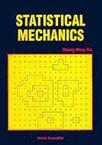统计力学STATISTICAL MECHANICS
1985-1
Aspen Publishers
Ma, Shang-Keng
548
无
A delight to read and provides such a firm foundation for further study in statistical mechanics that I, for one, will use it the next time I teach introductory statistical mechanics.
Shang-Keng Ma, Professor of Physics at the University of California, San Diego, died in his home in La Jolla on November 24, 1983. He was recognized as a leading theoretical physicist and educator in statistical physics.
Ma is perhaps best known for his contributions to the theory of critical phenomena. In collaboration with B. I. Halperin and R C. Hohenberg he pioneered the application of the renormalization group theory to critical phenomena. His book Modern Theory of Critical Phenomena (1976) has become a fundamental text.
During the last ten years of his life he was instrumental in the development of the Monte Carlo renormalization group technique, the random magnetic Ising model, the dynamics of spin-glasses and the "coincidence counting" method for calculating entropy from phase space trajectory.
Despite his declining health, Ma continued to teach until a few days before his death. He is survived by his wife and their two children.
PrefaceIntroductionPART I EQUILIBRIUM 1 Equilibrium 1.1 Equilibrium and Observation Time 1.2 Equilibrium and Molecular Motion 1.3 Large Scale Change and Local Equilibrium 1.4 Structure of Matter 1.5 Supplement and Conclusions Problems 2 The Basic Concepts of Thermodynamics 2.1 Equilibrium and Reversible Processes 2.2 Work and Heat 2.3 Adiabatic Process and Entropy 2.4 Absolute Temperature and Entropy 2.5 The Ideal Gas 2.6 The Second Law of Thermodynamics 2.7 The Efficiency and Speed of a Heat Engine Problems 3 The Law of Detailed Balance 3.1 The Energy Distribution of the State 3.2 The Energy Distribution of Fermions 3.3 Conservation Laws, Chemical Potential and the Constant Term in the Entropy 3.4 Distribution of Bosons and Black Body Radiation 3.5 Chemical Reactions and the Law of Concentrations Problems 4 Electrons in Metals 4.1 Dense Ideal Gas 4.2 Heat Capacity 4.3 Influence of Periodic Structure 4.4 The Structural Change Caused by Electrons ProblemsPART II HYPOTHESIS 5 The Basic Assumption of Entropy and Molecular Motion 5.1 Region of Motion 5.2 Assumption for the Calculation of the Entropy 5.3 Fermions 5.4 The Ideal Gas 5.5 Some Special Features of High Dimensional Space 5.6 Peak Integration and the Law of Large Numbers 5.7 The Law of Equipartition of Energy 5.8 Perspectives of the Region of Motion 5.9 Trajectory and the Region of Motion Problems 6 Some Elementary Applications of the Basic Assumption 6.1 Systems and Subsystems 6.2 Vibrations 6.3 The Debye Model 6.4 Phonons and Second Sound ……PART III PROBABILTYPART IV APPLICATIONSPART V DYNAMICSPART VI THEORETICAL BASESPART VII CONDENSATIONReferencesIndex

无
统计力学STATISTICAL MECHANICS PDF格式下载